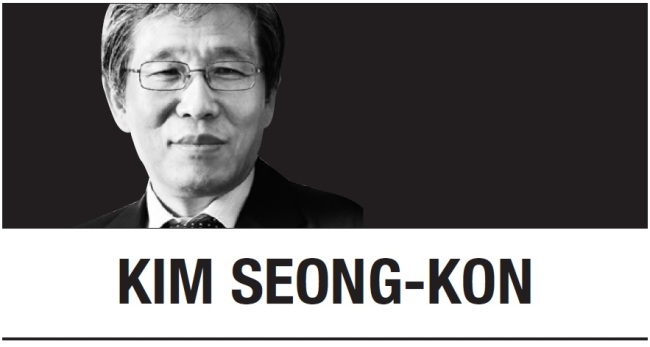[Kim Seong-kon] Advice from Churchill for today’s Korea
By Korea HeraldPublished : June 5, 2018 - 17:39
 After reading my column “Advice from Adm. Yi Sun-sin for young Koreans,” my friend Theresa sent me a list of advice from Winston Churchill that was delightfully insightful and compelling, especially for today’s Korea. Indeed, Churchill was not only an extraordinarily competent statesman, but also famous for his exceptionally keen wit and penetrating humor. Even today, Churchill’s perceptive, yet humorous counsel is still very appealing.
After reading my column “Advice from Adm. Yi Sun-sin for young Koreans,” my friend Theresa sent me a list of advice from Winston Churchill that was delightfully insightful and compelling, especially for today’s Korea. Indeed, Churchill was not only an extraordinarily competent statesman, but also famous for his exceptionally keen wit and penetrating humor. Even today, Churchill’s perceptive, yet humorous counsel is still very appealing. As a master diplomat, for example, Churchill speaks with authority when he defines his craft: “Diplomacy is the art of telling people to go to hell in such a way that they ask for directions.” Regrettably, our politicians, who do not understand the subtlety of diplomacy, are not only embarrassingly outspoken but are too often blunt and even rude. They may think of it as being manly, but it truly is not. Instead, diplomacy should be subtle, flexible and refined.
Another bit of advice from Churchill is quite persuasive, too. He famously says, “If you’re not a liberal at 20, you have no heart, but if you’re not a conservative at 40, you have no brain.” According to Churchill, it is not normal if young people are conservative and old people liberal. Of course, there is no rule that is without exception, and therefore there could be some young conservatives and old liberals. However, if a majority of old people are liberals and vice versa, then Churchill says it is not normal. We should have the discretion not to live in a society of heartless and brainless people.
Churchill’s advice is also quite enlightening and timely when he states, “If we open a quarrel between past and present, we shall find that we will lose the future.” Unfortunately, our politicians often appear to be too obsessed with the past and tend to blame present problems on past mistakes or else use long past incidents to condemn and cripple political opponents. Churchill advises us that if we keep doing it, there is no future for us.
Instead of instigating a quarrel between the past and the present, therefore, we should be prepared for what lies ahead of us and forge our future. Especially when our future is as nebulous and precarious as it so often appears to be these days, we cannot afford to waste our time on the past. Instead of digging up past mistakes to take revenge upon our political foes, we should move on toward the future. As Churchill says, “You will never reach your destination if you stop and throw stones at every dog that barks.”
Churchill also cautions us, “An appeaser is one who feeds a crocodile hoping it will eat him last.” Obviously, Churchill wrote it while the United Kingdom was at war with Nazi Germany, perhaps thinking about his predecessor Neville Chamberlain who was so naive that he was completely deceived by Hitler. He advises that an appeaser can be easily deceived by untrustworthy, belligerent powers despite his good intention.
Churchill warns about socialism, too. According to Churchill, “Socialism is a philosophy of failure, the creed of ignorance and the gospel of envy; its inherent virtue is the equal sharing of misery.” It is true that socialism, despite its utopian vision, is likely to end up distributing poverty, not wealth. Churchill was well aware of the problems of capitalism as well. He says, “The main vice of capitalism is the uneven distribution of prosperity.” But he appropriately adds, “The main vice of socialism is the even distribution of misery.”
Contrary to what we might think, Churchill advises, “You don’t make the poor richer by making the rich poorer.” Regrettably, however, we tend to abhor the rich and want to deprive them of their wealth. The problem is that even though we can make the rich poor, we cannot make the poor richer. The irony is that the economy is good when the rich spend money. That is to say, paradoxically, the more the rich spend, the more the poor can derive benefit from it.
By the same token, Churchill warns of the danger of tax increases. Politicians may think that tax increases are the easiest way to get hold of money to improve the economy, but Churchill says it is not. He says, “We contend that for a nation to try to tax itself into prosperity is like a man standing in a bucket and trying to lift himself up with the handle.”
Churchill counsels, “A nation that forgets their past has no future.” That does not mean that we should cling to the past; it means we should not distort or deny the past and learn from it instead. In order to be a prosperous nation both economically and culturally at this critical juncture, we should keep Churchill’s advice in mind.
Kim Seong-kon
Kim Seong-kon is a professor emeritus of English at Seoul National University and distinguished visiting professor at George Washington University. He can be reached at sukim@snu.ac.kr –Ed.
-
Articles by Korea Herald











![[Today’s K-pop] BTS pop-up event to come to Seoul](http://res.heraldm.com/phpwas/restmb_idxmake.php?idx=644&simg=/content/image/2024/04/17/20240417050734_0.jpg&u=)





![[KH Explains] Hyundai's full hybrid edge to pay off amid slow transition to pure EVs](http://res.heraldm.com/phpwas/restmb_idxmake.php?idx=652&simg=/content/image/2024/04/18/20240418050645_0.jpg&u=20240418181020)

![[Today’s K-pop] Zico drops snippet of collaboration with Jennie](http://res.heraldm.com/phpwas/restmb_idxmake.php?idx=642&simg=/content/image/2024/04/18/20240418050702_0.jpg&u=)